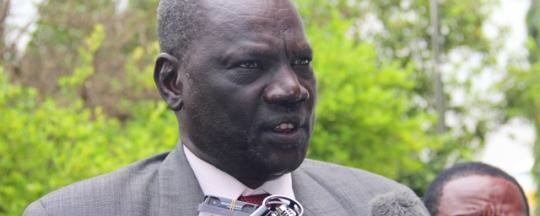Representatives of the SPLM-G10 and SPLM-Juba factions who participated at the latest round of peace talks in Addis Ababa say they are optimistic a peace deal can be reached next month, but the SPLM-IO are more cautious.
Michael Makuei, the government spokesman and a senior member of the SPLM-Juba faction, spoke to journalists on arrival from Addis Ababa to Juba on Monday. He explained that no comprehensive agreement on power-sharing was reached in Addis Ababa but noted that negotiations on the outstanding issues will continue.
He said there was a partial agreement on some points including how a transitional government of national unity can be formed and the timetable for doing so. He indicated that the negotiations will be resumed on 19 February, and by mid-March a comprehensive agreement will hopefully be signed so that the transitional period starts on 1 April.
The government official also pointed out that both sides recommitted to an earlier cessation of hostilities agreement.
SPLM-IO deputy head of information and public relations Manawa Peter Gatkuoth likewise confirmed in an interview on Monday the agreement on recommitment to the earlier Cessation of Hostilities Agreement. He also pointed to the commitment to form a transitional government of national unity as well as reach an amicable solution to the South Sudan crisis.
But he stressed that the views of the two warring parties, SPLM-IO and SPLM-Juba, are still very far apart. Manawa described what was reached by the two leaders as a “diplomatic agreement”. He blamed Juba and IGAD for the failure to reach a final agreement.
“All the outstanding issues that caused the conflict are unresolved up to now, so I can say our
views with the government are still very far apart,” he said.
“The proposal put forth by IGAD is rewarding the Juba government by giving it 60% share in the government and maintaining the national legislature. So IGAD is encouraging the government to refuse to reach an agreement,” he claimed.
“If we accepted the agreement now we will not be able to bring any reform in South Sudan, it is like we returned back to 2013 crisis,” he added.
As to the issue of what powers will be given to Riek Machar — a major point of contention — Manawa disclosed the SPLA-IO has demanded to give the earlier agreed powers of the earlier proposed prime minister instead to the newly proposed position of first vice president.
But the government has not agreed to specify constitutional powers for the newly proposed first vice president position. Instead, Makuei said the two vice presidents would be given only “competencies delegated to them by the president.”
Asked about the vice president’s powers, Makuei said it was still one of the outstanding issues noting, however, “We are optimistic that we will agree.”
He acknowledged also that the rebel demand to dissolve and then reconstitute the national parliament is another disagreement, as is the question of the system of governance during the transitional period in South Sudan.
“The position of the government is that the federal system will be applied after the transitional period, while the opposition is demanding the federalism right from the beginning of the transitional period,” he said.
For his part, Deng Alor, a member of the SPLM ‘former detainees’ faction, told Radio Tamazuj that the two parties have not reached an agreement. He pointed out that the two sides only outlined the agreed points in order to facilitate the negotiations.
He said Riek Machar wants executive powers and not merely ‘non-executive’ powers — a demand the Juba government rejects. But the SPLM leading member expressed optimism that the two parties could reach an agreement when they return to the negotiations on 19 February.
File photo: Michael Makuei Lueth




